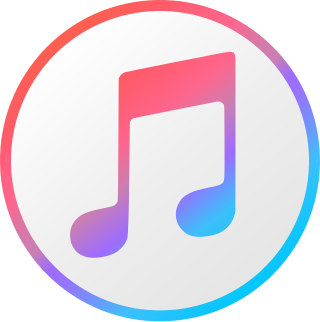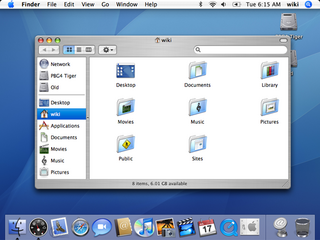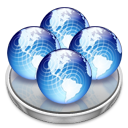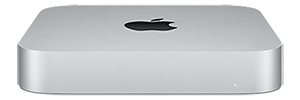
macOS, originally Mac OS X, previously shortened as OS X, is an operating system developed and marketed by Apple since 2001. It is the primary operating system for Apple's Mac computers. Within the market of desktop and laptop computers, it is the second most widely used desktop OS, after Microsoft Windows and ahead of all Linux distributions, including ChromeOS.

Mac OS X Server is a series of discontinued Unix-like server operating systems developed by Apple Inc. based on macOS. It provided server functionality and system administration tools, and tools to manage both macOS-based computers and iOS-based devices, network services such as a mail transfer agent, AFP and SMB servers, an LDAP server, and a domain name server, as well as server applications including a Web server, database, and calendar server.
The history of macOS, Apple's current Mac operating system formerly named Mac OS X until 2011 and then OS X until 2016, began with the company's project to replace its "classic" Mac OS. That system, up to and including its final release Mac OS 9, was a direct descendant of the operating system Apple had used in its Mac computers since their introduction in 1984. However, the current macOS is a UNIX operating system built on technology that had been developed at NeXT from the 1980s until Apple purchased the company in early 1997.

iTunes is a software program that acts as a media player, media library, mobile device management utility, and the client app for the iTunes Store. Developed by Apple Inc., it is used to purchase, play, download and organize digital multimedia on personal computers running the macOS and Windows operating systems, and can be used to rip songs from CDs as well as playing content from dynamic, smart playlists. It includes options for sound optimization and wirelessly sharing iTunes libraries.

Calendar is a personal calendar app made by Apple Inc. for its macOS, iOS, iPadOS, and watchOS operating systems. It offers online cloud backup of calendars using Apple's iCloud service, or can synchronize with other calendar services, including Google Calendar and Microsoft Exchange Server.
The Worldwide Developers Conference (WWDC) is an information technology conference held annually by Apple Inc. The conference is usually held at Apple Park in California. The event is usually used to showcase new software and technologies in the macOS, iOS, iPadOS, watchOS, tvOS, and visionOS families as well as other Apple software; new hardware products are sometimes announced as well. WWDC is also an event hosted for third-party software developers that work on apps for iPhones, iPads, Macs, and other Apple devices. Attendees can participate in hands-on labs with Apple engineers and attend in-depth sessions covering a wide variety of topics.

Mac OS X Jaguar is the third major release of macOS, Apple's desktop and server operating system. It superseded Mac OS X 10.1 and preceded Mac OS X Panther. The operating system was released on August 23, 2002 either for single-computer installations, and in a "family pack", which allowed five installations on separate computers in one household. Jaguar was the first Mac OS X release to publicly use its code name in marketing and advertisements.
Apple Developer is Apple Inc.'s website for software development tools, application programming interfaces (APIs), and technical resources. It contains resources to help software developers write software for the macOS, iOS, iPadOS, watchOS, tvOS and visionOS platforms.

Mac OS X 10.1 is the second major release of macOS, Apple's desktop and server operating system. It superseded Mac OS X 10.0 and preceded Mac OS X Jaguar. Mac OS X 10.1 was released on September 25, 2001, as a free update for Mac OS X 10.0 users. The operating system was handed out for free by Apple employees after Steve Jobs' keynote speech at the Seybold publishing conference in San Francisco. It was subsequently distributed to Mac users on October 25, 2001, at Apple Stores and other retail stores that carried Apple products.

Mac OS X Tiger is the 5th major release of macOS, Apple's desktop and server operating system for Mac computers. Tiger was released to the public on April 29, 2005 for US$129.95 as the successor to Mac OS X 10.3 Panther. Included features were a fast searching system called Spotlight, a new version of the Safari web browser, Dashboard, a new 'Unified' theme, and improved support for 64-bit addressing on Power Mac G5s. Mac OS X 10.4 Tiger also had a number of additional features that Microsoft had spent several years struggling to add to Windows with acceptable performance, such as fast file search and improved graphics processing.

Xsan is Apple Inc.'s storage area network (SAN) or clustered file system for macOS. Xsan enables multiple Mac desktop and Xserve systems to access shared block storage over a Fibre Channel network. With the Xsan file system installed, these computers can read and write to the same storage volume at the same time. Xsan is a complete SAN solution that includes the metadata controller software, the file system client software, and integrated setup, management and monitoring tools.

Mac OS X Server 1.0 is an operating system developed by Apple, Inc. released on March 16, 1999. it was the first version of Mac OS X Server.

Mac OS X Leopard is the sixth major release of macOS, Apple's desktop and server operating system for Macintosh computers. Leopard was released on October 26, 2007 as the successor of Mac OS X Tiger, and is available in two editions: a desktop version suitable for personal computers, and a server version, Mac OS X Server. It retailed for $129 for the desktop version and $499 for Server. Leopard was superseded by Mac OS X Snow Leopard in 2009. Mac OS X Leopard is the last version of macOS that supports the PowerPC architecture as its successor, Mac OS X Snow Leopard, functions solely on Intel based Macs.
Apple Open Directory is the LDAP directory service model implementation from Apple Inc. A directory service is software which stores and organizes information about a computer network's users and network resources and which allows network administrators to manage users' access to the resources.

Mac OS X Snow Leopard is the seventh major release of macOS, Apple's desktop and server operating system for Macintosh computers.

Xgrid is a proprietary grid computing program and protocol developed by the Advanced Computation Group subdivision of Apple Inc.

Mac Mini is a small form factor desktop computer developed and marketed by Apple Inc. As of 2022, it is positioned between the consumer all-in-one iMac and the professional Mac Studio and Mac Pro as one of four current Mac desktop computers. Since launch, it has shipped without a display, keyboard, and mouse. The machine was initially branded as "BYODKM" as a strategic pitch to encourage users to switch from Windows and Linux computers.
Mac operating systems were developed by Apple Inc. in a succession of two major series.

OS X Lion, also known as Mac OS X Lion, is the eighth major release of macOS, Apple's desktop and server operating system for Mac computers.













